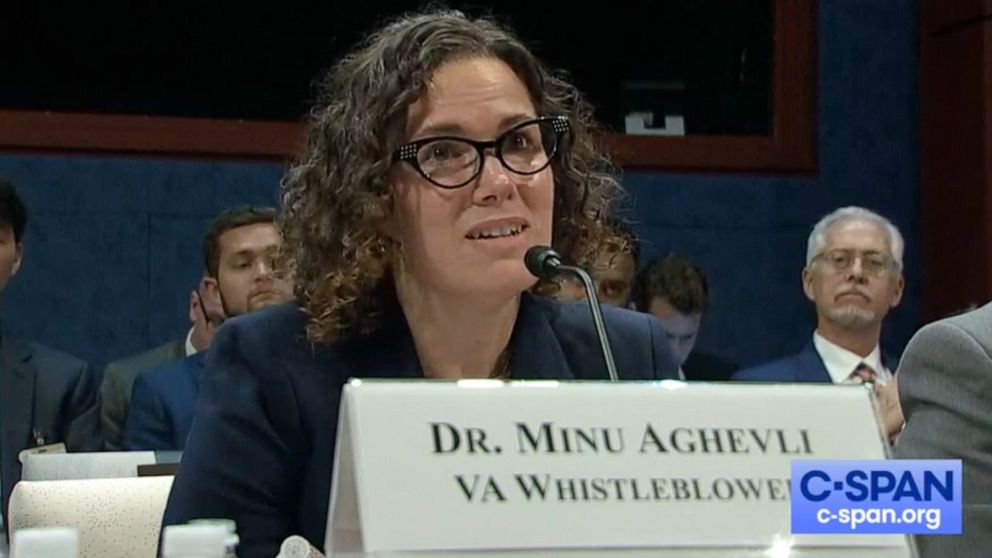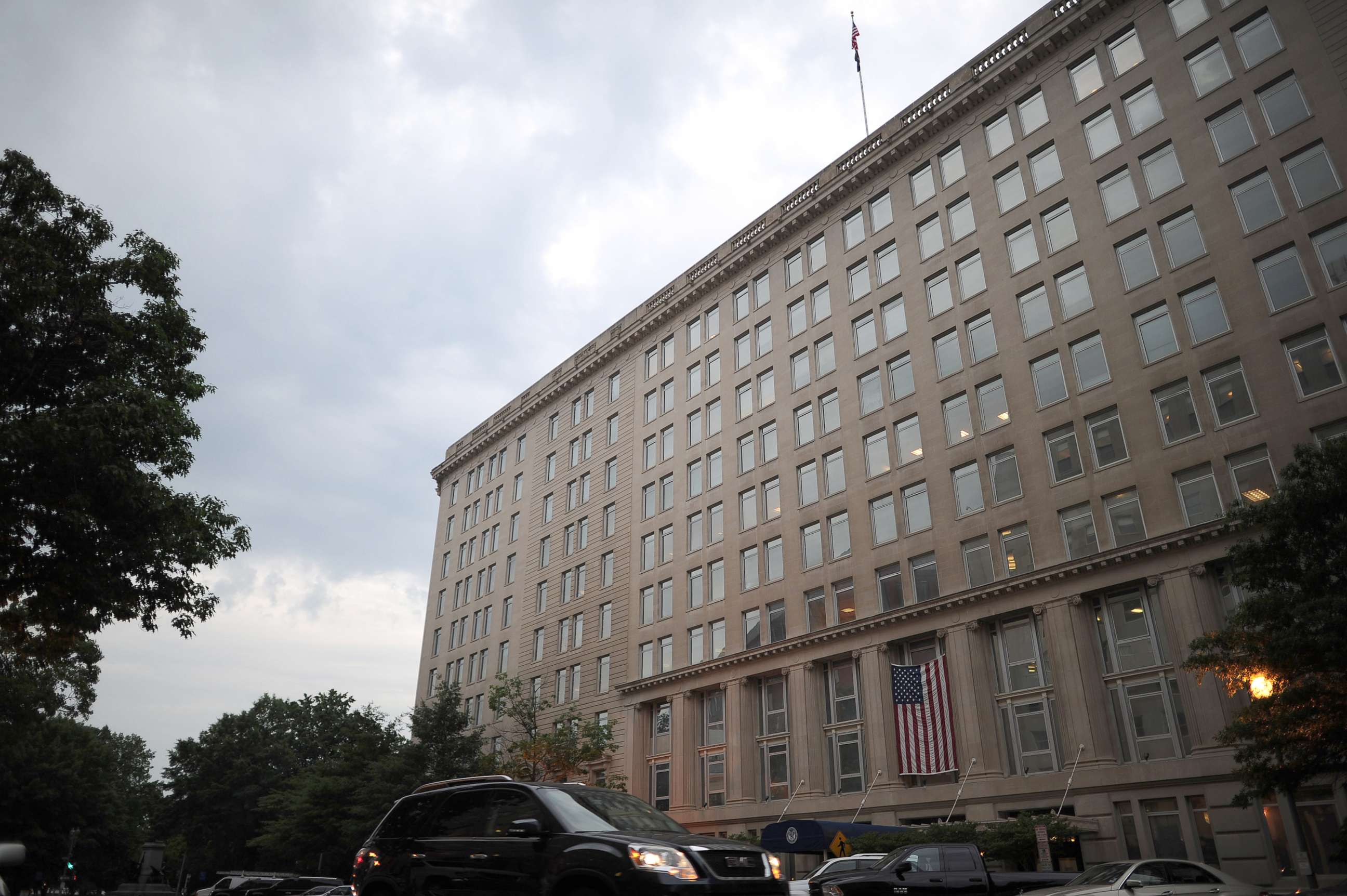Veterans Affairs whistleblowers call for end to culture of retaliation
The employee received a letter the day before she was set to testify.
A Department of Veterans Affairs health care worker said she received a letter from the agency on Monday notifying her that she would be terminated, just one day before she was scheduled to testify at a congressional hearing about how the VA treats other whistleblowers.
Baltimore psychologist Minu Aghevli said she received the letter, which outlined the VA Maryland Health Care Center's proposal to terminate her employment, after working for the agency for nearly 20 years and raising concerns for years about the quality of patient care and manipulating wait lists in opioid treatment programs. In an earlier letter, the VA says she was facing disciplinary action for treating a patient at a non-VA hospital and violating the agency's code of conduct, but she and her lawyer argue the agency is retaliating against her for raising concerns about problems within the department.
The agency denies that the notice was related to her testimony.
The VA has faced dozens of complaints from whistleblowers who say they were retaliated against for raising concerns about the quality of medical care for veterans or actions by agency officials, according to the agency that handles whistleblower complaints from federal employees. Aghevli and two other whistleblowers from the agency testified in front of the House Veterans' Affairs Committee on Tuesday saying the agency has a culture of trying to silence or punish people who report problems.

Aghevli called the termination proposal scary, because she said it appears to be a warning shot to ward off other potential whistleblowers.
"This feels obviously retaliatory, but worse than that I feel like I'm being used as a threat against other employees who might think about speaking up about patient care concerns and I resent that. I do not want to be used as a pawn," she testified on Tuesday.
Aghevli first reported concerns over hospital waitlists in 2014, just as a national scandal erupted over wait times, amid allegations patients had died waiting for care at a VA facility in Phoenix.
"In order to reduce the waitlist, I was instructed to improperly remove veterans from the electronic waitlist by scheduling fake appointments for them in an imaginary clinic," Aghevli said in remarks she prepared to share with Congress on Tuesday. "This clinic was not tied to any provider or location, nor did it actually correspond to any real visits...The veterans scheduled for these fictitious appointments were not actually receiving VA care.
"The VA also pressured me to artificially reduce the number of patients on the waitlist through other improper means," she added.
The VA's internal watchdog has investigated concerns about wait lists in opioid treatment facilities in Maryland, though it does not specify if it was prompted by Aghevli's complaint. The inspector general's inquiry published in 2018 confirmed that the VA's opioid program transferred veterans waiting for treatment to another list where they essentially wouldn't be counted. In an earlier report, the agency said they would improve internal controls by 2017 to ensure that all patients receive treatment.
Aghevli said the VA has "engaged in continuous retaliation" against her in an apparent effort to oust her from the agency ever since she first reported her concerns, including being stripped of patient-care privileges and assigned to do "menial administrative tasks."
"Two months ago, I was told that my clinical privileges are being suspended. So since that time I have been forbidden from having any clinical contact with patients and I was assigned to pretty menial administrative tasks," she said. "It felt like I was put in a position where I would be especially visible to other staff to make it sort of a publicly humiliating situation."
A letter from her legal team to the Office of Special Counsel -- which aims to safeguard federal employees, especially whistleblowers -- says Aghevli received the "notice of proposed removal" on June 24.
"The notice of proposed removal was issued immediately after the Agency learned that Dr. Aghevli's disclosures would be the subject of a front-page story in USA Today and that she would be testifying before Congress," her legal team wrote in the letter to OSC.
"The reasons set forth by the Agency for proposing Dr. Aghevli's removal are without merit and cannot be the actual reasons for proposing her removal."
Aghevli did not send ABC News a copy of the letter because she said wanted to send her official response first.
Aghevli, who served as the former coordinator of the department's opioid addiction treatment program in Baltimore, said hospital officials cited in the letter an ongoing matter with a patient's follow-up care and gave her several business days to respond. In her testimony on Tuesday, she said her privileges were suspended in April because she visited a high-risk patient in a local hospital after he overdosed, and that the patient disclosed he attempted suicide after leaving the VA facility.

Aghevli declined to offer specific details about the April incident, citing potential patient privacy concerns, but she said it involved a "high risk veteran" who had visited the hospital’s emergency room in the past.
"So basically, what they say is I shouldn't have followed up with this high risk veteran in a community hospital, despite everything the VA says about following up with high risk veterans," she said. "The VA says that we should engage them, keep them involved in care and provide proper mental health treatment."
In a statement, the VA Maryland Health Care System said the notice of proposed termination was not related to her scheduled testimony on Tuesday.
"Dr. Aghevli will have an opportunity to respond to the proposed action, and a regional VA leader will decide whether to uphold it or mitigate it after ensuring all procedural protections in the VA Accountability and Whistleblower Protection Act have been met," it said in a statement, adding "identifying as a whistleblower doesn’t shield someone from accountability when they have failed to uphold VA’s values and committed clear instances of misconduct."
Another VA whistleblower who testified Tuesday, Katherine Mitchell a physician and consultant for the VA in Arizona, said she has faced continued retaliation even after the concerns she raised were addressed. She was one of the first people to raise concerns in 2014 about officials manipulating wait lists and jeopardizing care for veterans in Arizona.
She said she's seen a lot of improvement in patient care at the VA but that there's still a culture where some agency leaders make it difficult for people concerned about behavior that could be dangerous for patients to come forward.
"This has nothing to do with who’s in office. Things got worse two years ago because the media's attention turned off whistleblowers and turned on to politics and other things," she said Tuesday.
"It has nothing to do with who's in the president's office or who controls Congress. This is a malignant leadership culture that will outlast us all unless someone has the courage to break rank in leadership and finally change it."
